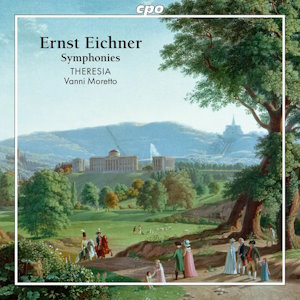
Ernst Eichner (1740-1777)
Symphony in D major, Op. 11, No. 3
Symphony in F major, Op. 10, No. 3
Symphony in D major, Op. 1, No. 1
Symphony in B flat major, Op. 7, No. 2
THERESIA/Vanni Moretto
rec. 2022, Sala Ghislieri, Mondovì, Italy
cpo 555 580-2 [64]
Although Ernst Eichner lived for less than 37 years, he was relatively prolific in composing around 30 symphonies. They all date from the 1770s, and this disc offers an example each from four of his six published sets, spanning the earliest and latest. Eichner is one of the composers grouped together as the ‘Mannheim School’, on account of the influential and highly regarded court orchestra there, even though he did not work there himself. His symphonies have remained virtually unknown until now, due to a lack of reliable, accessible editions, which has prevented his work from being given exposure in other such recorded series as Chandos’s Contemporaries of Mozart or Naxos’s The 18th Century Symphony. But the internationally assembled, period instrument Theresia orchestra, and Vanni Moretto aim to put that right.
The symphonies featured here remain in the mould of the Italianate three movement opera sinfonia out of which the form had grown earlier in the century, rather than expanding to four movements as other composers were beginning to do in the same decade as these. But Eichner exhibits a quite developed grasp of the increasingly important sonata form, such that these compositions are no mere lightweight, entertaining curtain openers, but fully fledged symphonic dramas in their own right, insofar as the form of the symphony had expanded by this time. Moretto leads Theresia in lively and enthusiastic accounts, with jostling, ebullient textures from the full orchestra when called for. Horns, timpani, and lower strings give the music a rasping raucousness that is characteristic of historically informed performance practice, and won’t be to all tastes, but it makes for a thrilling experience here, not least in the rushing ascending scales – the famous ‘Mannheim rocket’ device – with which Eichner announces his very first published symphony.
The sequences of tremolando semiquavers in unison octaves in that movement also evoke here a monumentality that perhaps looks as far ahead as the mightier edifices of Bruckner’s symphonies, which utilise the same technique on a much larger canvas. It’s intriguing too that the second subject of Op. 7 No. 2’s first movement is heralded by the same arpeggio figure, and in the same key of F major, with which Haydn would later start his Symphony No. 89. It comes off emphatically in this recording, and it makes one wonder whether Haydn knew the work and thought it worth exploiting more fully as his arresting opening gesture, especially as a bustling, harmonically shifting passage follows in both cases.
The disc opens with the latest symphony of the selection, from the Opus 11 set, the only one with an Adagio introduction. If there are foreshadowings of the later Classical repertoire, here it is of the ‘Prague’ Symphony, especially in the portentousness with which Theresia imbue that slow, grand opening and some sections of the succeeding Allegro. They make the most of its Mozartian bravado too, the horns adding a certain edginess. In the Presto finale of Op. 10 No. 3, however, these instruments are somewhat more restrained, and so the effect is more of a vivacious dance like a gigue than a sturdy hunting piece, as its 6/8 meter would otherwise suggest.
The strings by themselves tend to be graceful or affable, particularly in the slower middle movements, all of which are marked Andante and so have a suitable rhythmic lift rather than lethargy. Even though the principal key of Op. 10 No. 3’s middle movement is F minor, not A flat major as the notes suggest, the darkness of that key hardly obtrudes, but the texture remains transparent and airy. Overall these are collegial, sympathetic readings of works, filling in a not uninteresting gap in our knowledge of the 18th century symphony.
Curtis Rogers
Buying this recording via a link below generates revenue for MWI, which helps the site remain free




















